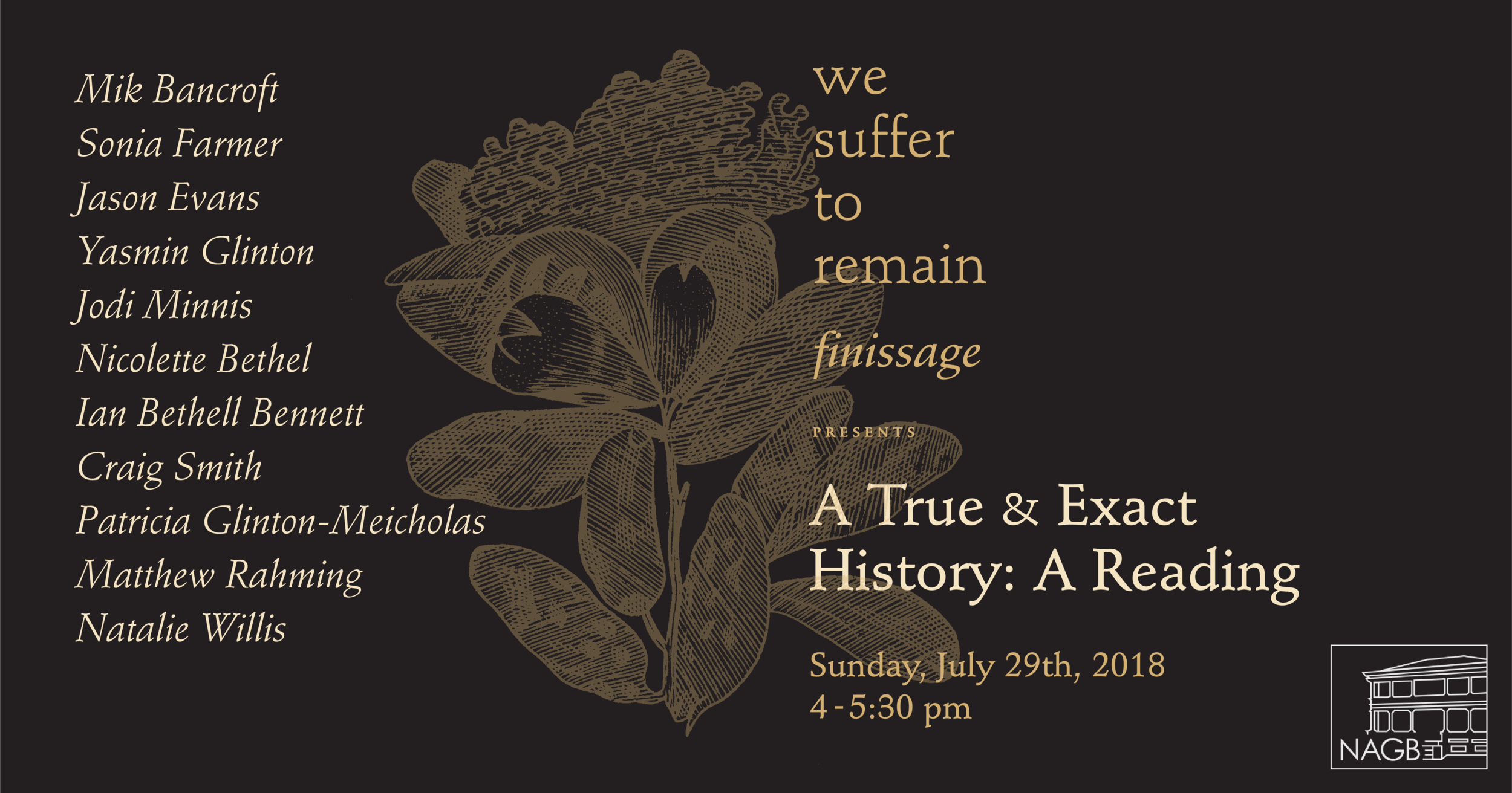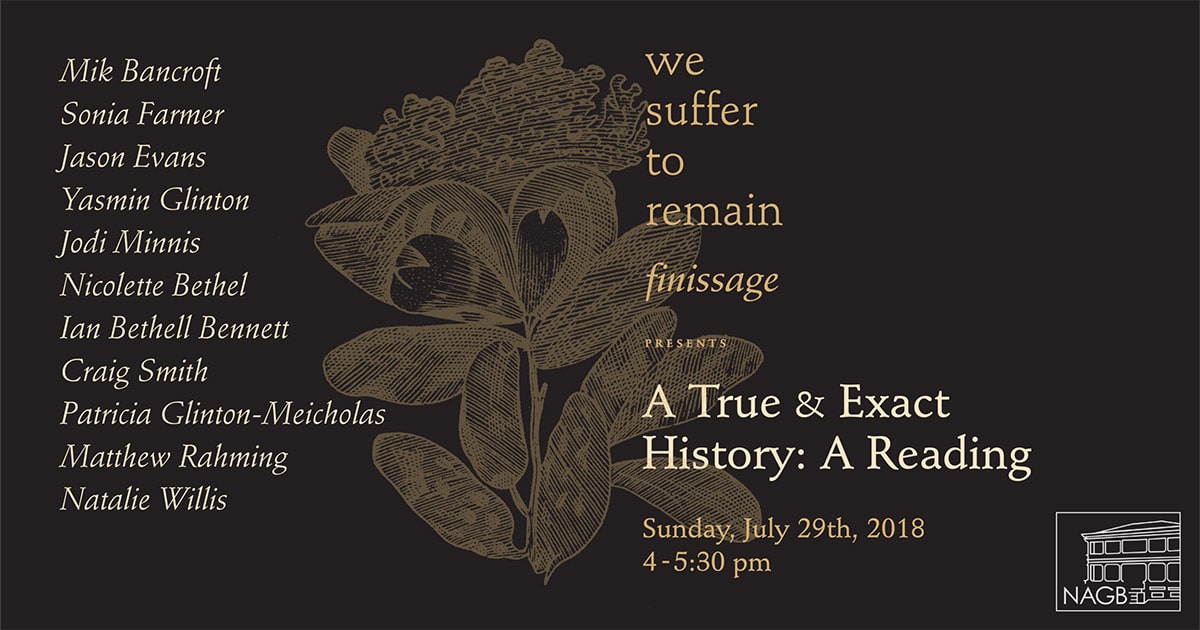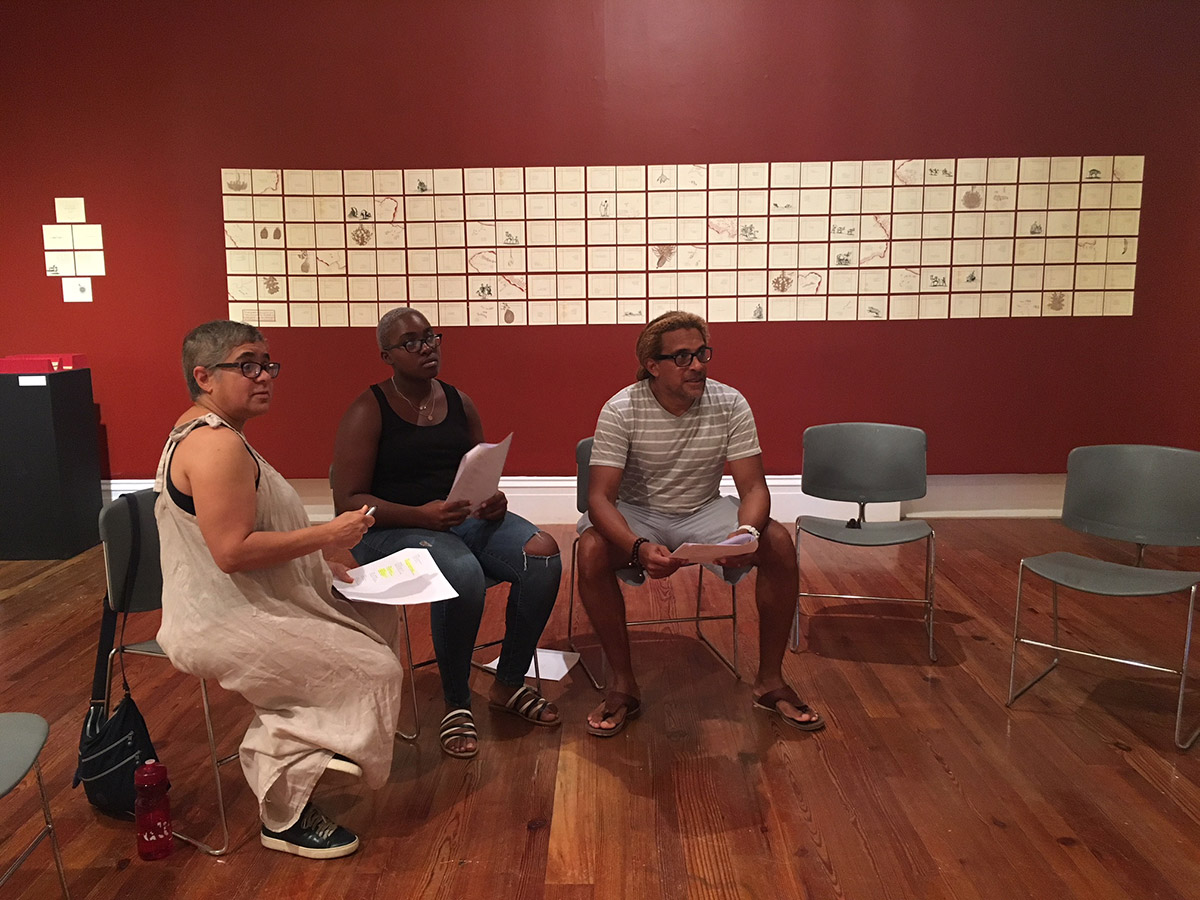
By Natalie Willis
For the closing event and finissage of the exhibition “We Suffer To Remain” -Sunday, July 29th–we are left to critically, crucially, question the work of language.

Promotion for Sonia Farmer’s “A True and Exact History: A reading. Design by Kriston Chen.
“I suffer to remain, Saint of a wild mad Land”
The Caribbean has transitioned from this “wild, mad land” of disease and mystery into the tropical Eden we ubiquitously see in media today. But just what makes this place what it is? Who suffers to remain, and who are the saints and sinners? Sometimes it is easy to get lost in the cacophony of voices in the history of this region. In a place suffering from the silencing of so many, it is harder still to discern what voices are speaking – be they loud, soft, deafening, or a whisper.
The Ex-pat. Immigrant. Undocumented. Citizen. Slave. Historian. Slave-Master. The Indigenous. The Island Eden. The Colonized Island. The Free Nation.
These are some of the voices of Sonia Farmer’s “A True and Exact History” (2018), as a part of the exhibition “We Suffer To Remain” which hinged on the idea of “Difficult Conversations” (as the series of exhibitions through the Caribbean in collaboration with the British Council was so aptly named). Using an erasure of “A True & Exact History of the Island of Barbados” published in 1657 by Englishman and immigrant to Barbados, Richard Ligon, Farmer takes his voice and authority as author and scatters it into this distillation of voices that so aptly represent the pain and love of the Caribbean, of what she calls our “wild mad Land”.
As it is currently displayed in “We Suffer To Remain” in book form, Farmer’s own artistic voice plays into the difficulties and dynamics of power in the space – the voice of man, of woman; the voice of whiteness, of Blackness. Language, and how we wield it, is incredibly potent in this space – it is what makes this region so very particular. The re-framing of language moved us from place of exile to place of healing in the Western gaze and imagination, and now Farmer takes the historic words out of a white, English mouth to remove his hold on this place, to take his own words in an act that is political and subversive to give voice to this myriad of characters whose tales have not been told nearly enough in the Caribbean story.
For the finissage and closing event of the exhibition however, Farmer gives cord, throat, and air to these voices and makes them flesh through a haunting reading of the poetry in “A True and Exact History” (2018).

The group of readers and performers practicing for the performance of “A True and Exact History” for Sunday, July 29th at 4:00pm.
A troupe of 11 readers represent each character or “voice” contained within the larger poem of “A True & Exact History”. We hear the Ex-pat (Mik Bancroft), perhaps imagined as Ligon himself, in conversation with White Immigrant (Sonia Farmer), where we are told “there is no land in a free heart mixt with Cruelties”.

Bold and brash and unapologetic, the Undocumented Island Resident (Jason Evans) speaks emphatically with the Island Citizen (Yasmin Glinton): “Being here a prisoner is the greatest art I am exactly made for”.
The “chapters” of conversation shift from these very present, contemporary conversations, into more murky historical territory, from lived figures transitioning into ideas and histories personified. African Slave (Jodi Minnis) speaks with Historian (Nicolette Bethel) and Colonial Slave Master (Ian Bethell-Bennett): “If I were to build myself in that place, I would have a story, and you shall feel the hot Country I grew weary of”.

Rehearsals for the reading of “A True and Exact History” featuring the entire cast of speakers.
Indigenous Caribbean (Craig Smith) speaks with the Edenic Island (Patricia Glinton Meicholas) of the waves of colonial impact from Columbus to Victoria: “I have been told what shapes they bear out of your mouth, touch them, till we cannot perceive any island that bears an English name”.
And finally, to close, the Colonized Island (Matthew Rahming) converses with the Free Nation (Natalie Willis), with choice lessons in what is left of a people made disparate, who endured sustained violence for oh so long: “forraign forces lay their powder in, and I came away, divided into eleven”.

Rehearsals for the reading of “A True and Exact History”
Shifting from colonial English confidence, through to unabashed dialect, to lush, hushed voices of Caribbean garden to the confused and crestfallen colonized-turned-free nation, the speakers deftly take us through not only the voices of the poem, but of many of the schizophrenic and sedimented feelings we have as both Bahamians and Caribbean people. They reflect our history, our present, the utopia we hope for and the dystopian realities we deal with as postcolonial people and nomads.
The finissage for “We Suffer To Remain” featuring this powerful performance lead by Sonia Farmer will begin at 4:00pm sharp on Sunday, July 29th, 2018. The event is free and open to the public.